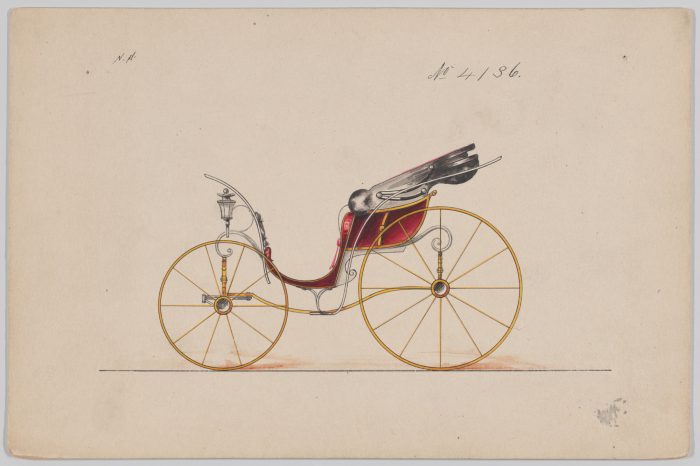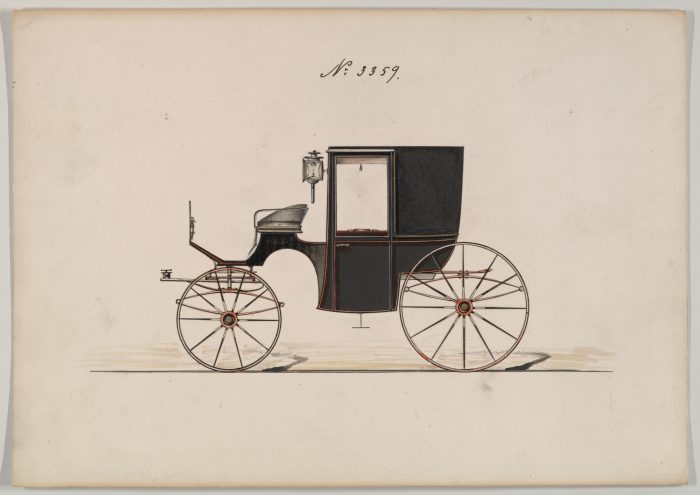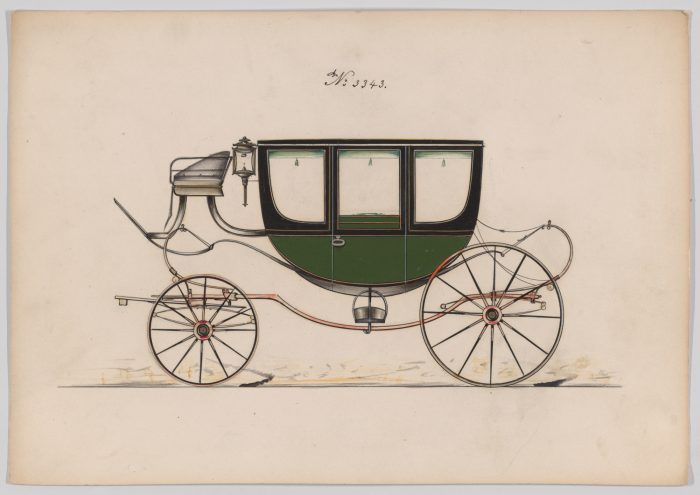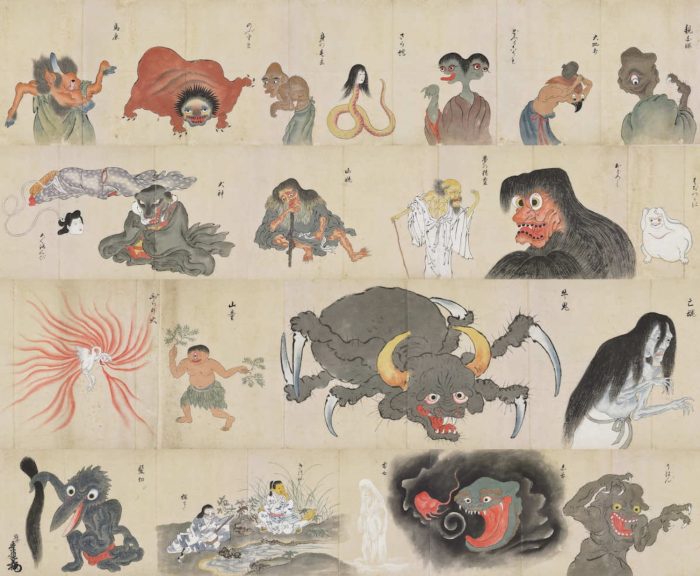


Designs for (from top) pony phaeton, brougham, and curtain coach from Brewster & Co., c.1870

I was surprised not to be able to find a full-resolution image of the lovely panoramic background from the sacred forest scene in Princess Mononoke. I assembled this one from screengrabs. It had to be cropped a bit and there’s an imperfection on one of the trees that’s in the film, but it’s better than any other version I could find. Click this one for full size:

After answering someone asking online for useful macros and scripts using AutoHotKey, it appears a little trick I’ve been using for years could be useful to others.
I tend to keep Notepad open most of the day for little tasks like de-formatting text or taking notes, but it’s annoying to bring up when I’m already typing. So I made a little script to do it without reaching for my mouse or alt-tabbing around.
When I hit tilde (`), the script launches Notepad with a new, untitled plaintext document if there isn’t one already. If I’m in another window or application, it will switch focus to that document. And if I’m already focused on Notepad, it will close the document (after confirmation). That’s all! It’s very simple and very useful. Maybe you can use it too. (Code after the fold.)
Read moreSharon Van Etten – “Your Love is Killing Me”
Are We There
Having heard the instantly and unforgettably catchy “Every Time the Sun Comes Up I’m in Trouble” at a coffee shop, I knew I liked the artist, but it wasn’t until I heard this song that I understood her real power as a songwriter. Van Etten uses the lower limits of her voice’s register and the belly notes swell operatically, working alongside epic arrangements that reminded me of Weyes Blood. The love she sings of is thankfully fictitious for her, but as she noted in an interview, that doesn’t make it any less real for some. (bandcamp)

Inspired by Ambrose Bierce’s endlessly entertaining and edifying Write it Right, I’ve collected a few errors (or so I see them) frequently found amid the flood of writing that makes its way online every day. They are not all incorrect per se, but as Bierce pointed out, over and above being merely correct, writing may also be unambiguous — and we should always strive to make it so.
This list is (and will forever remain) a work in progress.
ahold: ‘Get ahold of’ may roll off the tongue in person but this colloquialism has no real reason to exist in writing outside of dialogue.
disinterested: Used almost exclusively now to mean ‘uninterested’ in place of that perfectly good word. But disinterested refers to having no ‘interest’ in a financial or personal sense, as in a conflict of interest. One who is disinterested in (or more properly, from) something has nothing to gain or lose in connection with it, so their actions can be considered to have no ulterior motive. Similarly one cannot ‘have a disinterest in’ something — say they have no interest, or a lack of interest.
begs the question: The battle by pedants (including myself in the past) to rescue this saying from corruption is long lost and was misguided to begin with, considering ‘beg the question’ is at best an ambiguously worded paraphrase of a logical fallacy seldom found in ordinary discourse. If something raises or prompts a question, or conversely if it moots or presupposes its answer, say that. Avoid the original construction entirely and avoid the possibility of confusion, derailment, and unwanted commentary.
comma pause: Commas are punctuation that formally divide a sentence, and should not be used in expository writing to dictate its pacing or emphasis. For instance: ‘The CEO said that, “We will look into it” ‘ or ‘She determined that moment, that she would look into it.’ If the effect is important the sentence can usually be rearranged to achieve it and remain grammar, but be wary of changing the meaning.
six-feet: Variations of this type of hyphenation abound: ‘the screen is eight-inches wide,’ ‘she was five-feet, seven-inches tall,’ ‘it was four-and-a-half hours.’ When dimensions are being enumerated, no hyphen is necessary. It is when they act as a compound adjective that they must be united for clarity: ‘the board was two feet long’ vs ‘a two-foot-long board.’
add on, add in, continue on, etc.: The verb alone is usually sufficient. Incidentally, as hyphenated nouns (add-ons), these sound commercial.
in between: As above, the ‘in’ may be omitted with advantage.
in order to: ‘In order’ is superfluous in most cases and can be omitted. Variants of this may perform work under other circumstances, however, such as ‘as a means to.’
irregardless: No such word.
Songs: Ohia – “Travels in Constants”
Travels in Constants
Reading the Chicago Reader’s heartbreaking account of Jason Molina’s long, troubled career, I was surprised to see no mention of what is by far my favorite work of his, the supremely intimate and evocative untitled three-part track recorded for the Travels in Constants series. Unadorned, uncut, and unsurpassed in my opinion on lyrical genius for a songwriter famed for lyrical composition, this is to me the essential and eternal Molina.
blackleg: in labor, a scab; in cards, a cheat; in zoology and botany, a bacterial or fungal disease
fettle: condition; or, to finish a cast piece or repair a furnace by removing extra material
espalier: a shrub or tree grown flat against a wall, or the framework used to do so
caducity: the quality of frailness or elderliness, or being transitory or perishable
poll evil: a condition among horses in which the back of the head swells
revetment: angled fortification to absorb the force from a body of water
marcescent: withering but not yet dropping (e.g. leaves in early fall)
withes: supple twigs or rope made from such; also spelled withies
electrolier: a chandelier with electric lights rather than candles
dottle: the plug of ash and tobacco left in a pipe after smoking
hod-me-dod: a snail, or a girl’s curls. In Norfolk, a hedgehog.
carlin: in Scotland, an old woman; also, a pug
cairngorm: a smoky yellow or dark quartz
enfeoff: to grant someone a feudal estate
fulgurant: like lightning, flashy or dazzling
writhen: twisted, wound, or cortorted
swot: scholar or studious person
yegg: a burglar or safecracker

Athanasius Kircher welcomes guests to the Collegio Romano. Kircher speculated in his time that “plague in general is a living thing,” as this Public Domain Review piece explains.
Goldmund – “Grass Rides”
Famous Places
Goldmund’s melancholy, barely-there compositions make excellent background music, but occasionally one emerges with a clarity of theme that demands attention. This one reminds me of Hauschka’s “Paige and Jane.” (bandcamp)